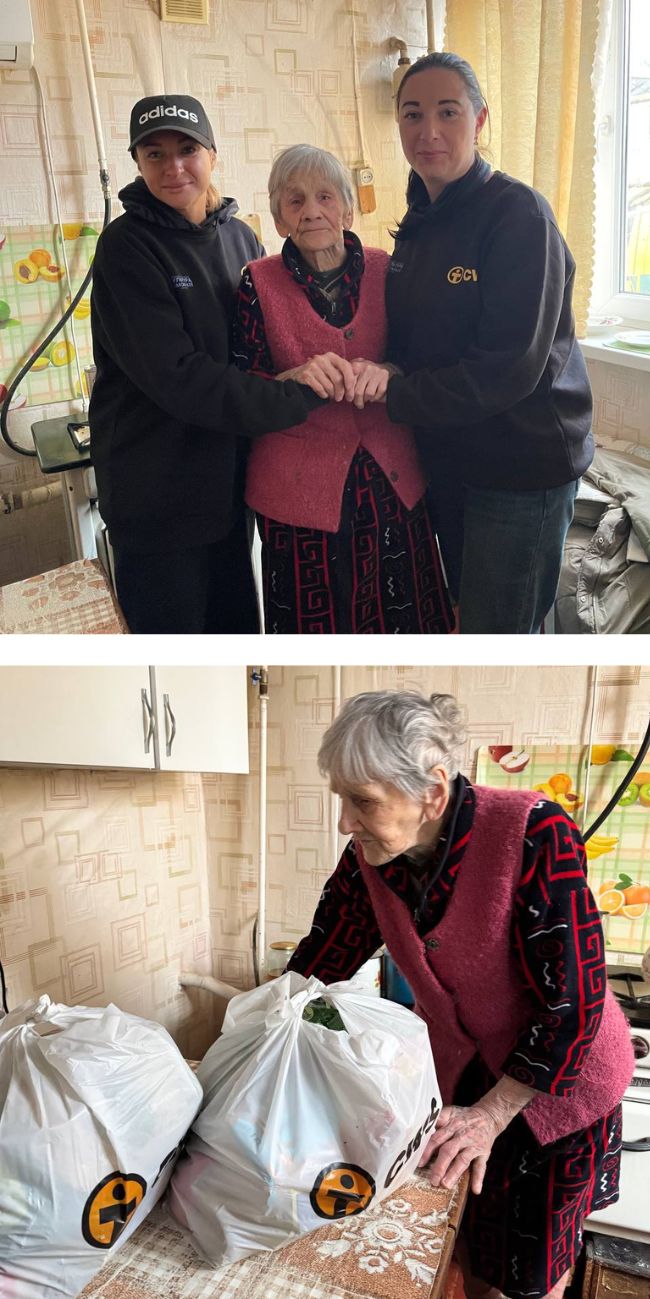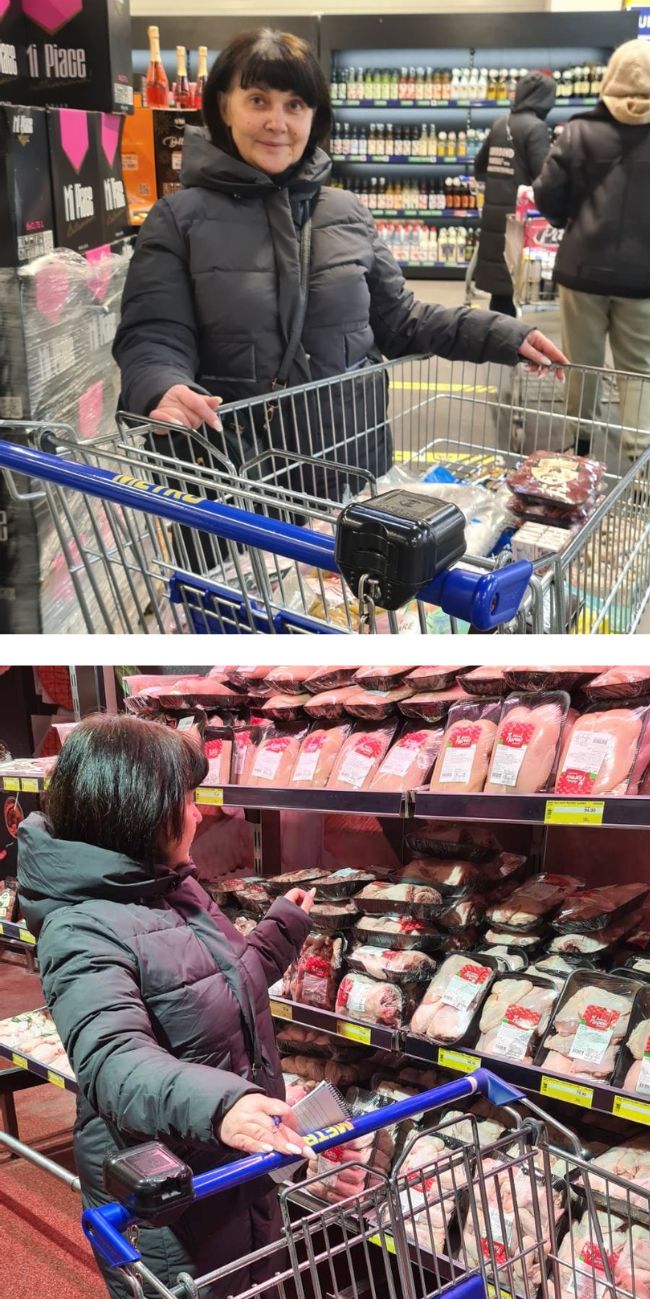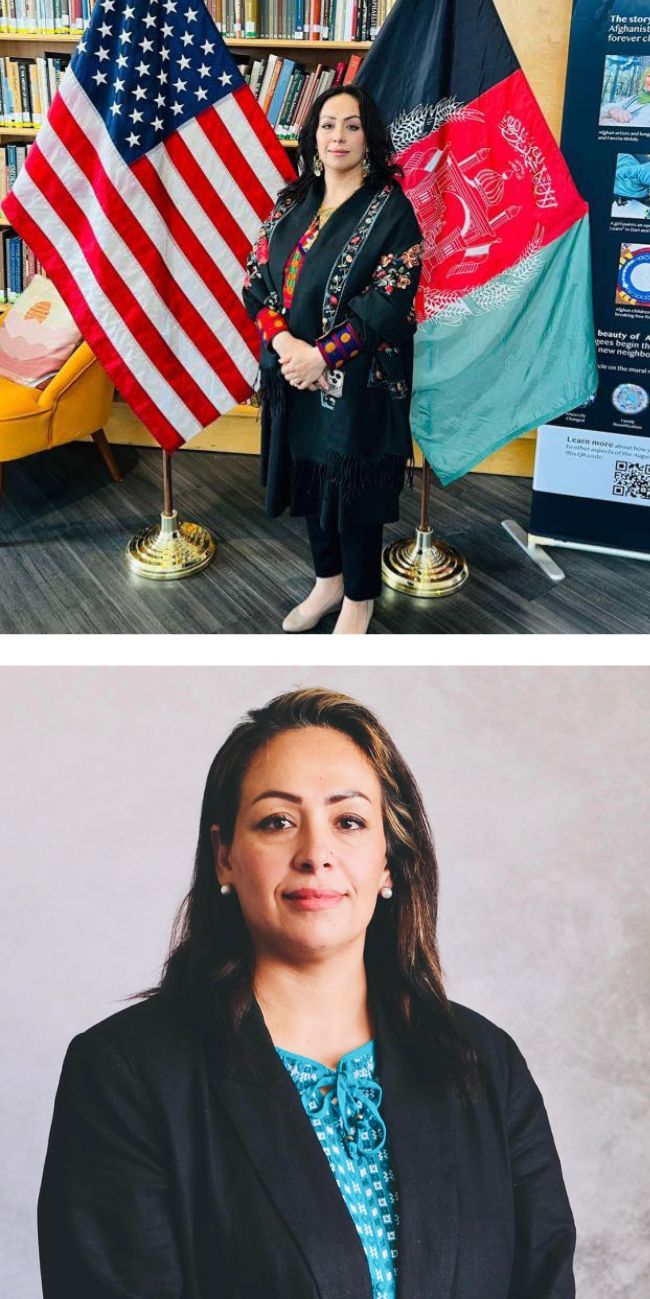Rule would prevent disaster response organizations from serving some survivors at the expense of all Washington, D.C.—Church World Service today denounced a new rule from the Department of Homeland Security that would harm survivors of disaster. Released just ahead of hurricane season, the rule would prevent disaster response organizations from accessing Federal Emergency Management Agency (FEMA) funds if they are …
The Rise of Global Hunger: From Scarcity to Solutions
The world is currently experiencing a food crisis of unprecedented proportions. Conflict, climate extremes and poverty are among the primary drivers that have caused up to 319 million people across 67 countries to face chronic hunger. What causes global hunger? The world produces enough food to feed everyone on the planet. The issue isn’t supply—many of our global neighbors are …
TAKE ACTION: Urge U.S. Officials to Stop Famine and Save Lives in Gaza
August 27, 2025
Right now, Gazans are dying of starvation as Israel continues to block food from entering the Gaza Strip. The United Nations reports that a “worst case scenario of famine” is underway. Church World Service recently joined Churches for Middle East Peace and a diverse coalition of 114 other faith-based organizations and humanitarian actors in urging governments around the world to …
Growing Hope in Timor-Leste: Santina’s Journey to a Healthier, Stronger Future
August 19, 2025
The below testimonial is written by Santina, a participant of the Growing Hope Project*, supported by CWS. Improving Food Security and Income My name is Santina*, and I live in Lisadila village [in Timor-Leste] with my husband and our four children. We have always relied on farming and raising livestock to support ourselves. However, with an income of about $50 …
Stories of Change

Top and Bottom: Ekaterina receives services and support through CWS local partner Culture of Democracy
Through War and Time: The Enduring Spirits of Ekaterina and Sofia
Since Russia’s full-scale invasion of Ukraine in 2022, CWS has expanded its support to reach some of the country’s most vulnerable populations. Through the Caring Hearts project, we’re partnering with local organizations to provide essential aid and emotional support to older adults living in remote villages of Odesa Oblast.
In the quiet corners of Ukraine’s Odesa Oblast region live two extraordinary women—Ekaterina Borisovna Zheltova and Sofia Fedorovna Kiseolar—each over 100 years old, and each a living testament to the resilience of the human spirit. Both have endured famine, war, occupation and loss, yet continue to face life with strength and dignity.
A Century of Strength: Ekaterina’s Story
When she was only eight years old, Ekaterina survived the Holodomor, a man-made famine engineered by the Soviet government of Joseph Stalin, during 1932-1933. Unfortunately, she faced more hard years ahead when she was only 18 years old and the start of World War II broke out. Ekaterina was forced to grow up too quickly, helping her parents from an early age survive.
After World War II ended, Ekaterina married, living with her husband in Germany for several years. They eventually moved to Ukraine before finally ending up in Balta, a city in Odesa Oblast, and her family began to integrate into their new home as her husband joined the military reserve and she found work in a garment factory. Soon after, the young couple welcomed a son and daughter to the family.
“Now I dream that the war will end,” Ekaterina shared with us. From her small pension, she supports the Ukrainian military, contributing funds that go towards food supplies for those serving in the war.
Sofia’s Legacy of Endurance
Sofia, who turned 100 years old this year, is a living history. When she was only 15 years old, World War II began. Having lived through Nazi occupation and Soviet power, Sofia understands war and famine all too well. Now, she is forced to live through a new war.
Despite the many challenges she’s faced, Sofia always remained strong. She raised three sons, the youngest of whom, 70-year-old Anatoly, today takes care of his mother. Sofia worked in a hospital for many years and, after retirement, worked as a cook for another two decades.
Today, Sofia warmly received our team and admitted that she has been a little weak lately. But she does not complain about life—she only remembers what he experienced with the wisdom of a person who has seen a whole century of history.
Through the Caring Hearts project, women like Ekaterina and Sofia are receiving more than just material support—they are receiving the dignity of being seen, heard and cared for. The project provides food, hygiene supplies, medical assistance and psychosocial support to older adults in some of the most remote and underserved areas of Odesa Oblast.
These women—and many others like them—serve as living reminders of resilience in the face of hardship. Their stories inspire hope and underscore the importance of standing with those who have already sacrificed so much.
The “Caring Hearts” project is implemented by our local partner in Ukraine, Culture of Democracy, with support from Church World Service and technical assistance from the Regional Development Agency of the Odesa Region and Kuyalnytskyi Village Amalgamated Territorial Community. We are also grateful for our valued partners, the Evangelical Lutheran Church in America and Church of the Brethren, for their support of this work. To learn more about our Ukraine response, click here.
Stories of Change

Irina shops for groceries with support from the food vouchers she received through Diaconia
Warmth, Comfort and Hope: How Winterization Support Helped Irina’s Family Through Uncertainty
When war forced Irina to flee Ukraine with her two grandchildren, she became their sole caregiver in a new country, carrying the weight of both survival and hope. Thanks to the CWS winterization project, Irina’s family found comfort, support and a reason to believe in brighter days ahead.
A Grandmother’s Brave Decision
Before war broke out in Ukraine, 58-year-old Irina enjoyed a simple but peaceful life. She worked in a small local clothing boutique and enjoyed living with her son, daughter-in-law and two grandchildren, who filled her life with warm laughter and happy memories. Then, in an instant, everything changed.
After two months of bombings, fear gripped the family. Their home in Odesa no longer felt safe, and the constant uncertainty began taking a physical and emotional toll on Irina’s two grandchildren, who began having panic attacks and could no longer sleep through the night.
Irina realized she had an impossible choice to make. Heartbroken, she took her grandchildren and left for the neighboring country of Moldova, leaving behind her son and daughter-in-law who needed to stay behind for work.
Since they arrived in Moldova, Irina has been playing multiple roles as both grandparent and parent. She found an apartment to rent in Balti, and the children have started school and begun to settle into their new community. But life away from home is not easy.
Rent and medical treatments for her grandson, who lives with a disability, are expensive. Irina hopes to find work, but as the sole full-time caregiver, finding employment is difficult, and without a stable source of income, it can be difficult to make ends meet.
Winter Support and Hope for Tomorrow
The CWS winterization project, in partnership with local organization Diaconia, provided a lifeline for Irina, who received food vouchers and critical hygiene supplies. With this support, she was also able to save some extra money to afford her grandson’s medications.
“Thanks to the food we bought in December, we enjoyed the holidays to the fullest and had a diversified meal on New Year’s Eve and Christmas,” Irina shared. Though the family is now financially stable, homesickness still weighs on them every day. “We are comfortable in Moldova, but we pray that we can return home as soon as possible, without fear.”
Until the day Irina and her grandchildren can return home and reunite with the rest of their family in safety, they continue to push forward and remain hopeful for all that the future holds.
This story is possible thanks to CWS’s membership in ACT Alliance, a global coalition of churches and agencies engaged in development, humanitarian assistance and advocacy. It is also supported by the generosity of UMCOR. You can learn more and support CWS’ work with Ukrainian refugees in Moldova here.
A New Beginning: Daryna’s Journey to Safety and Stability
August 15, 2025
After fleeing the war in Ukraine, Daryna and her young daughter found refuge in the United States under Humanitarian Parole. With support from CWS Fort Collins, she successfully navigated childcare, work and legal pathways, ultimately receiving Temporary Protected Status and the ability to continue working. From War to Welcome: Building a New Life in Colorado When bombing began around their …
Four Years after the Fall of Kabul, Afghan Allies and Families Still Await Lasting Protection
Washington, D.C.—Today, August 15th, marks four years since the fall of Kabul to the Taliban. Two weeks later U.S. forces would complete the withdrawal from Afghanistan, leaving many at risk for standing with U.S. military and civilian personnel. Since then, millions of Afghan individuals and families were forced to flee their homes and seek refuge around the world, with over …
Soaring Beyond Borders: An Afghan Pilot’s Journey
August 14, 2025
On August 15, 2021, when Kabul fell to the Taliban, around 200,000 Afghans evacuated to safety in the United States, while many more remain in danger. Today, as we mark four years since the fall of Kabul, we share the testimony of one individual who was on track to become one of the first female light attack helicopter pilots in …
Stories of Change

Top and Bottom: Najia
Five Minutes to Leave Everything Behind: Najia’s Journey from Kabul to Community Leader
When the Taliban took control of Kabul in 2021, Najia had just minutes to decide to leave her home, unsure if she would ever return. Now in the United States, she leads efforts to support thousands of Afghan newcomers—proving that refugees bring immeasurable value, resilience and leadership to their new communities.
Imagine if your entire life changed within the span of five minutes. That, in an instant, you had to prepare to leave your home behind, unsure if you would ever return. For Najia, those five minutes came in the form of a phone call on August 17, 2021—just two days after the Taliban had taken control of Kabul.
Due to her job, which supported the U.S. mission in Afghanistan, Najia knew she and her family were a target, and their home—the country where she was married and had three children, the place where her family, friends and loved ones lived—was no longer safe.
With only $300 in her pocket and the clothes she was wearing, Najia, her husband and their children boarded a plane to leave their home behind. Over the course of five flights across four different countries, they arrived at a military base in Indiana, alongside thousands of other Afghan newcomers, forced to face the same reality that they could not return home.
Before Kabul Fell: Life in Afghanistan
Like all refugees, Najia did not want to leave her home behind. Before Kabul fell, life in Afghanistan was filled with the warmth of loved ones and hope for a better future. “It was a golden period,” Najia shared. “I could enjoy the liberty of living in my homeland with my family and my relatives. I could see how my country was rebuilt; it was progressing, and I could see a lot of improvements—most importantly, as an Afghan woman.”
Those decades of progress seemingly washed away overnight. “Afghanistan was our home, our homeland. All of a sudden, it was occupied by the Taliban, and human rights were being taken away from children. Women are now forbidden from going to school.”
“We were forced to leave because we risked our lives day and night to support the U.S. government,” she shared. “We made a lot of sacrifices. Now, we seek the same support from the U.S. government to protect its Afghan allies.”
From Newcomer to Community Leader
Despite the heartbreak of leaving her homeland, Najia’s own difficult journey fueled her determination to help others facing the same challenges. Knowing firsthand how overwhelming it can be to start over in a foreign country, she was eager to support her neighbors from the moment she arrived in the United States. During her first three months, while living with her family on a U.S. military base, Najia stepped into action—volunteering to assist operations that served more than 7,000 newly arrived Afghans at Camp Atterbury in Indiana.
“I was a building leader for 280 women and children, working every day until midnight. [The military] was appointing leaders in the community to provide translation support and help newcomers access food, English classes and other activities. It was a privilege for me to help my own people, who came with nothing and were now living in a new environment.”
Her service didn’t stop there. After being resettled through a local resettlement agency, Najia stayed connected with many Afghan community members seeking services. When she realized there was no local organization dedicated to answering their questions, she decided to create one—the Afghan American Community Center (AACC)— alongside friends already working in the nonprofit sector.
Building a Community of Welcome and Support
Najia now works with a strong community of volunteers, all supporting Afghan newcomers who are able to arrive in the United States with Special Immigrant Visas (SIVs). She encourages U.S. citizens to volunteer in their local communities or advocate on behalf of their immigrant and refugee neighbors.
“There’s a strong call to action for our American friends and community members to advocate for family reunification and the resumption of the United States Refugee Admissions Program,” said Najia, who is now working to reunite with her mother—left in limbo in Afghanistan after being approved for departure, only to have her booked flight to the United States abruptly canceled.
Over the years, Najia’s leadership has only grown. Today, she serves as an acting leader at a local nonprofit that supports more than 2,000 Afghan community members with access to education, healthcare, civic engagement, legal services and basic needs. She also works as the Director of Refugee Resettlement with Patchwork Indy overseeing the Sponsor Circle program—a private sponsorship program that resettles Afghan SIV holders in the United States. through community sponsorship—and sits on the boards of several other organizations, partnering with groups like CWS to help Afghan newcomers create safe and stable new homes.
Looking back on the past four years, Najia hopes her journey serves as a reminder that building welcoming communities is essential—and that those forced to start over in a new country can, and often do, achieve extraordinary things that strengthen the places they now call home.
“I believe Afghan refugees are not a burden on the community. Refugees and immigrants come here with so many skillsets and give back so much to the United States. Doctors, engineers and so many others come here with valuable skills. They run restaurants, open stores and bring diversity. People are contributing to the workforce, the economy and the culture of this country. Now, the United States needs to uphold its promise and give back to its Afghan allies who have sacrificed greatly.”
Take action now to make a difference for those who need it most and ensure we live up to our promise as a nation.CWS also operates a local resettlement office in Indianapolis, Indiana, which you can learn more about here.
